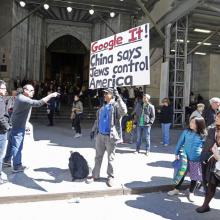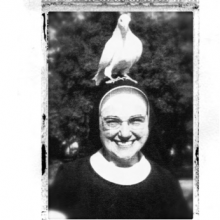New York Times
“I think there are aspects of people attempting to discuss politics in Christian terms, or people interpreting their politics through a Christian lens, that’s always going to lead to terrible arguments,” she said. God cares about politics, Coaston said, but not in such a literal way that God has an opinion on something like Medicaid expansion. To those using God-talk to drum up votes, Coaston asks: “Why would you want God to be that small?”

Image via Gil C/Shutterstock.com
On April 10, Columbia University presented 21 Pulitzer Prizes for achievements in journalism, literature, and music. Notables from the list of social justice-oriented works that received a Pulitzer Prize include: New York Daily News and ProPublica receiving the Public Service award for reporting on evictions of mostly poor minorities carried out by police abusing the law —
On Dec. 14 buses that were meant to evacuate citizens and rebel fighters out of Aleppo, Syria, after a raid and massacre by the Syrian government, left — empty, reports the New York Times. Gunfire has been heard by people who are still in the city, and it is believed that a ceasefire established on Dec. 13 — between the regime of Syrian president Bashar al-Assad and rebel fighters — has dissolved.
Canadian researchers are revisiting a hotly debated sociological question: Why do some churches decline while others succeed?
Since the 1960s, overall membership in mainline Protestant Christian churches has been dropping in both the U.S. and Canada.
But some congregations have continued to grow, and a team of researchers believes it now knows why. It’s the conservative theological beliefs of their members and clergy, according to researchers from Wilfrid Laurier University and Redeemer University College in Ontario.

Image via a katz/Shutterstock.com
A report released on Oct. 19 by the Anti-Defamation League does not directly indict Trump for this upswing in anti-Semitism. But it explicitly connects some of his supporters to the hate speech.
“The spike in hate we’ve seen online this election season is extremely troubling and unlike anything we have seen in modern politics,” said ADL CEO Jonathan Greenblatt.
To mark Pope Francis' visit to the United States, Sojourners has partnered with NextGen Climate to convene key interfaith leaders and activists to welcome the Pope and his call to action on climate change. The effort, including a full-page advertisement Friday in the New York Times and several other newspapers, features a letter signed by 36 interfaith leaders and activists including Rev. Jim Wallis, President and Founder of Sojourners.
The news coverage of international conflicts can be very disappointing from a mimetic perspective. When conflicts escalate into violence as in Syria or the Ukraine, news outlets rush to cover the hostilities. They give us the facts on the ground, or rumors thereof, accompanied by an almost mindless report of what each side is saying by way of self-justification. However, if you listen to their rhetoric with mimetically tuned ears, which happens after spending time here at Raven, you realize that their rhetoric is all sound and fury signifying nothing. Unfortunately, it is this “nothing” that usually makes the headlines.
Major outlets like the New York Times rarely give as good an analysis as my colleague Adam Ericksen did last week. Speaking of the crisis in Ukraine, Adam said that we often think conflict is the result of differences. But the truth is that rivals resemble each other in often surprising ways. They are in conflict because they share the same desires and so are locked in a competition for something that they cannot or will not share. In the case of the conflict over Crimea, the “thing” is not the region but power and prestige. Adam explains:
Russia’s desire for power is mimetic, or imitative, and modeled on its rival for power, the United States. Russia wants what the United States has — the prestige of being a global super power — and Russia is willing to use the same methods that the United States has used to gain and sustain that prestige — violence.
“She wakes to the sound of breathing. The smaller children lie tangled beside her, their chests rising and falling under winter coats and wool blankets.”
So begins the New York Times story following Dasani, an 11-year-old girl living homeless in New York. Dasani lives with her parents and seven siblings in a family residence shelter. From school to dance class to home, Dasani feels the weight of poverty and an unstable family.
According to the story, one in five children in America live in poverty, “giving the United States the highest child poverty rate of any developed nation except for Romania.”
In this five-part multimedia story, life told through Dasani’s eyes offers an honest look at homelessness and the pursuit for a hopeful future.
Read the full story here.
Author Malcolm Gladwell may not be known for writing on religion. His New York Times best-selling books “The Tipping Point,” “Outliers,” “Blink” and “What the Dog Saw” deal with the unexpected twists in social science research. But his newest book, “David and Goliath: Underdogs, Misfits, and the Art of Battling Giants,” also includes underlying faith-related themes, and not just in the title.
Gladwell said that while researching the book, he began rediscovering his own faith after having drifted away. Here, he speaks with RNS about his Mennonite family, how Jesus perfectly illustrates the point in his new book and how Gladwell’s return to faith changed the way he wrote the book.
A former United Methodist minister-turned-atheist was dismissed from her high-profile position at Harvard University on Thursday after it was revealed she falsified her resume.
Teresa MacBain, one of the most high-profile nonbelievers in the country after profiles by NPR, The New York Times, and Religion News Service, was fired from her newly created position with the Humanist Community at Harvard.
I don't think of myself as a news-reading star; many spend far more time than I do staying informed. But I do recognize that being informed takes effort. As more and more cities lose their newspapers, and as networks like Fox abandon any pretense of journalistic integrity and simply broadcast misinformation, the work of staying informed gets more complicated.
I occasionally read broadsides from Tea Party folks and wonder what alternate universe they inhabit. Their positions seem unhinged from fact, history, and generally accepted reality. I imagine they'd say that a world informed by "liberal media" like The Times isn't any closer to being fact-based.
How do we debate important issues when we don't share a common foundation of facts? Dueling opinions are the heartbeat of politics. Dueling facts, however, lead mainly to shouting, bullying and mistrust.
Just a few years ago, Ross Douthat earned the distinction of becoming the youngest regular columnist the New York Times has ever employed. He also has the unique position of being a conservative Christian in the belly of what some Christians might consider the proverbial “beast.”
So, how's that going for him?
“It’s been wonderful,” he told Michael Cromartie, Vice President at the Ethics and Public Policy Center, during an onstage interview at the Q Conference in Washington, D.C. Tuesday evening.
The conversation focused on the themes of Douthat’s new book, Bad Religion: How We Became a Nation of Heretics.
Among my must reads are the Sunday New York Times Book Review and other book reviews I come across in various media outlets. There are too many books being published that I would love to read, but just don’t have the time. So, I rely on reading book reviews as one way of keeping in touch with what’s being written.
Here are my picks in this week’s books of interest:
Two weeks ago, veteran New York Times reporter Anthony Shadid died from an asthma attack while exiting Syria.
Shadid and photographer Tyler Hicks, who had been kidnapped together while covering the Libyan uprising, were completing a week-long clandestine reporting visit to Syria, documenting the rebellion against President Bashar al-Assad’s government.
In the Sunday Times, Hicks told the story of that week in a long and gripping feature, "Bearing Witness in Syria," accompanied by some of his photos. The two journalists had spent most of the week with a group of activists.
Late last Thursday evening, getting one final fix of news before going to bed, I saw it. Anthony Shadid, the New York Times correspondent and Beirut bureau chief, had died from an asthma attack while ending a clandestine reporting trip into Syria. He apparently suffered the attack in a reaction to horses being used by smugglers helping him and a photographer leave the country.
When you read the news as much as I do, you learn which bylines to look for if you want the most comprehensive and well-written coverage of a story. Mr. Shadid was one of those correspondents.
In a career that included stints with the Associated Press, Boston Globe, Washington Post, and The Times; Mr. Shadid covered one of the most dangerous parts of the world — the Middle East. He was shot in the West Bank in 2002, kidnapped and beaten in Libya in 2011. He won two Pulitzer Prizes, in 2004 and 2010, for his reporting on the Iraq war; and has been nominated by The Times for a 2012 prize.
In his column for the New York Times, Nicolas Kristof tells the story of a 13-year-old girl in Brooklyn he calls “Baby Face." She had been sent into an apartment building by a pimp to meet a customer.
But, after being sold for sex five to nine times a day and beaten with a belt when she failed to bring in enough money, she told prosecutors later she was in too much pain to be raped by a john again.
Instead, she pounded on a stranger’s door and begged to use a phone. She called her mother and then 911.
Kristof writes:
The episode also shines a spotlight on how the girl was marketed — in ads on Backpage.com, a major national Web site where people place ads to sell all kinds of things, including sex. It is a godsend to pimps, allowing customers to order a girl online as if she were a pizza.
I am one of those who still prefer ink on paper to pixels on a screen. But no matter how you get your news, the passing of a giant is worth noting. Tom Wicker, reporter and columnist for The New York Times for 30 years, died on Saturday. The Times described him as “one of postwar America’s most distinguished journalists.”
Wicker was a meticulous reporter and a passionate advocate, so much so that he was sometimes criticized for overstepping the bounds of objectivity. But when faced with the major events he wrote on, how could he not be?
All of my life, religious sisters have had a special place in my heart and imagination.
I love nuns. LOVE them.
So a story in today's New York Times caught my eye (and my heart) immediately when I saw the headline: "Sisters of St. Francis, Quiet Shareholder Activists" and then the even-better headline on the story's web page at NYT.com: "Nuns Who Won't Stop Nudging."
Chris Hedges' statement on Occupy Wall Street read in part:
As part of the political theater that has come to replace the legislative and judicial process, the Securities and Exchange Commission agreed to a $550 million settlement whereby Goldman Sachs admitted it showed "incomplete" information in marketing materials and that it was a "mistake" to not disclose the nature of its portfolio selection committee. This fine was a payoff to the SEC by Goldman Sachs of about four days' worth of revenue, and in return they avoided going to court. CEO Lloyd Blankfein apparently not only lied to clients, but to the subcommittee itself on April 27, 2010, when he told lawmakers: "We didn't have a massive short against the housing market, and we certainly did not bet against our clients." Yet, they did.
Occupy Wall Sreet, false idols and a moral economy. Breaking the cycle of poverty. Poorest poor in U.S. hits a new record: 1 in 15 people. As poverty deepens, giving to the poor declines. Arianna Huffington: Shakespeare, the Bible and America's shift into a punitive society. Peaceful Occupy Oakland march followed by late-night clashes.











